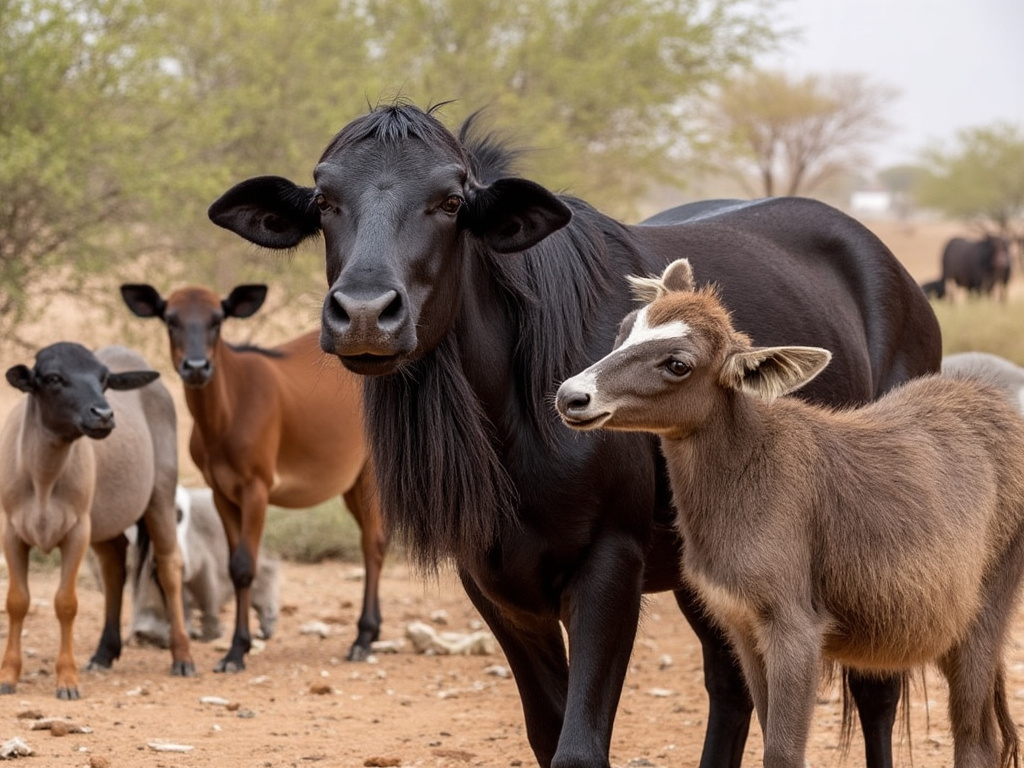The relationship between Muslims and animals is complex and deeply rooted in Islamic teachings, reflecting a blend of spiritual, ethical, and practical considerations. Here are key aspects of this relationship:
### 1. **Stewardship (Khilafah)**
- **Concept**: Muslims are seen as stewards or trustees (khulafā’) of the earth, which includes the responsibility to care for all of God's creation, including animals. The Quran (2:30) mentions that humans are appointed as vicegerents on earth, implying a duty to maintain and look after the environment.
- **Implications**: This stewardship involves ensuring that animals are not exploited or harmed unnecessarily, promoting a compassionate approach towards all life forms.
### 2. **Compassion and Mercy**
- **Prophetic Tradition**: The Prophet Muhammad (peace be upon him) set numerous examples of kindness towards animals. Hadiths (sayings and actions of the Prophet) recount stories where he showed mercy, like freeing a bird or ensuring animals were not overburdened or mistreated.
- **Quranic References**: The Quran encourages acts of kindness towards animals, suggesting that such acts are pleasing to Allah. For instance, in Surah Al-An'am (6:38), it's stated that "There is not an animal (that lives) on the earth, nor a being that flies on its wings, but (forms part of) communities like you."
### 3. **Permissible Uses**
- **Food and Sacrifice**: Islam allows the consumption of certain animals under the condition of halal slaughter, which is designed to minimize the animal's suffering. Animals are also used for sacrifice during Eid al-Adha, but this is done with specific guidelines to ensure respect and minimal pain to the animal.
- **Work and Transport**: Animals like horses, camels, and donkeys have historically been used for work and transport. However, Islam provides guidance on not overworking these animals or causing them undue harm.
### 4. **Ethical Treatment**
- **Prohibition of Cruelty**: There are explicit prohibitions against cruelty to animals. For example, killing an animal merely for sport or torturing it is considered sinful.
- **Rest and Care**: Animals should be given rest, food, and water. There's a famous hadith where the Prophet Muhammad condemned those who did not provide for their animals adequately.
### 5. **Scientific and Environmental Consideration**
- **Conservation**: Modern interpretations often extend Islamic teachings to include environmental conservation, where protecting animal species is seen as preserving Allah's creation.
- **Scientific Inquiry**: The Quran encourages observation of nature, which includes animals, as a way to understand and appreciate God's creation.
### 6. **Symbolism and Ritual**
- **In Religious Practices**: Animals play roles in religious practices, like the use of sheep or camels in the Hajj pilgrimage, but these roles come with responsibilities to treat the animals with dignity.
### 7. **Contemporary Issues**
- **Welfare Organizations**: In many Muslim-majority countries, there are animal welfare organizations influenced by Islamic ethics, focusing on preventing cruelty, providing medical care, and advocating for humane treatment.
- **Debates on Practices**: There are ongoing debates about practices like animal testing, factory farming, and hunting, where scholars and communities try to reconcile modern practices with Islamic ethics.
### Conclusion
The relationship between Muslims and animals is governed by a set of ethical, religious, and moral principles that emphasize stewardship, compassion, and justice. While there are allowances for the use of animals for human benefit, these are always framed within the context of kindness and respect for life, reflecting a holistic view of creation where humans are not above but part of the intricate web of life, responsible for its care.
